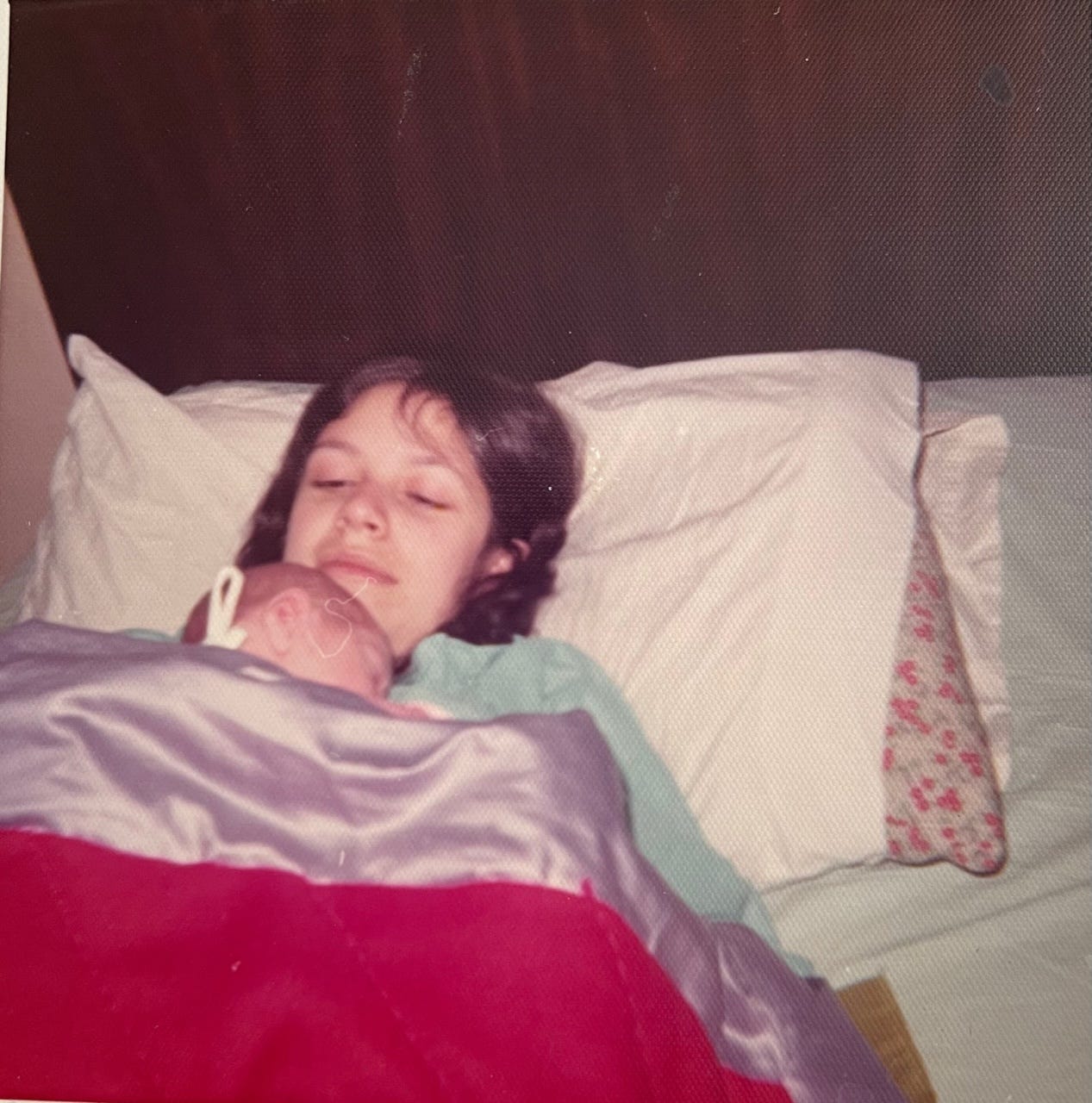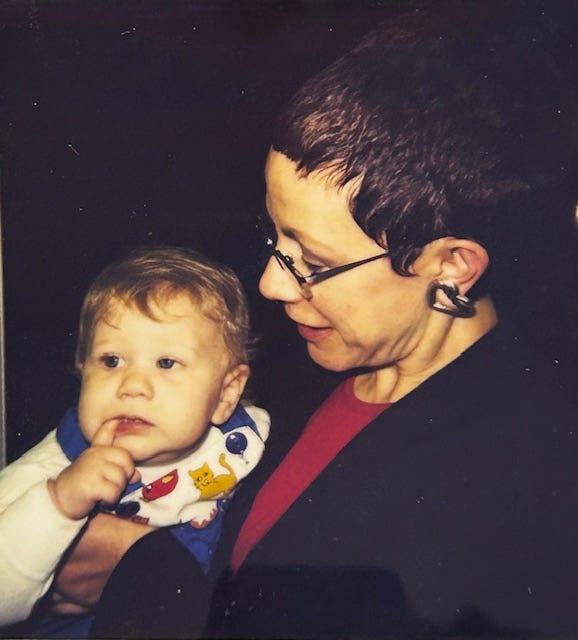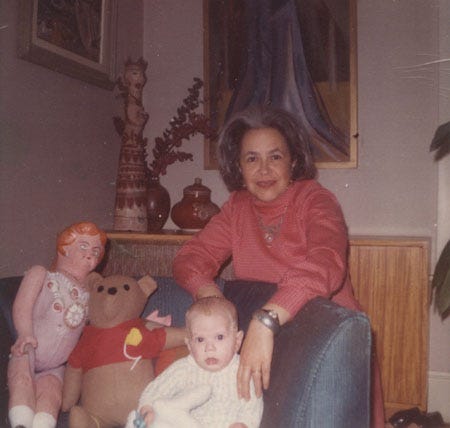My Own Kind of Grandmother
Some grandmothers dote. Some brag. I tell subversive tales about when Dad was a kid.
On my desk sits a photo of a boy with mischief on his mind. My grandson Colsen, age eleven. With his goofy grin and cocked head, he seems to be thinking about one of those endearingly dumb jokes that are part of children’s secret language. He looks nothing like me or my husband, or even like his father, Ben, my first rascal and only child. His resemblance to no one but himself pleases me. It suggests the man he’ll be soon enough, a man of humor and spirit who will carry a little of me into the world.
I don’t keep a copy of this photo in my purse, to many people’s surprise—the mailroom guy at my former job, the owner of my local deli, my breeze-shooting seatmates on planes. They can’t understand why a woman with a grandchild would not want to show off his photo to all and sundry. Isn’t doting every grandmother’s time-honored privilege?
I’ll pass, thank you. To me Colsen’s school portrait, and the memories it evokes, are too personal a pleasure for sharing with strangers. They would see just another sixth-grader with freckles and slightly buck teeth; I see a boy whose unexpected birth rearranged my entire mental landscape and unearthed, by degrees, an attachment that both echoed and deepened my love for his father, another unexpected baby.
Both babies arrived amid other preoccupations—Ben when I was an anxious newlywed of 22, struggling to remain a full-time student; Colsen early in my tenure as a magazine editor-in-chief, just after I turned 47. Both times I stumbled into an awesomely complex transition years ahead of my friends, and had to find my way alone. I was the first to scour the city for trustworthy daycare, the first to be accused of neglecting my child because I held a full-time job, the first to come home from a weekend getaway and find that my teenager had held a drunken bash so rowdy, the police came to our door. I worked it out by trial and error, often fearful that I must be falling short.
When Ben grew up to be a generous-hearted young man, it seemed I could finally relax. Then one April evening, he dropped by for pizza. He was twenty-five, just starting out in his career. When I asked about his girlfriend, he flashed an odd little smile, equal parts dismay and delight. Then he came straight to the point: “She’s pregnant. We’re keeping the baby.”
I was about to become a grandmother. What would this mean to a woman of my time? And who could help me rise to the occasion?
No one in my circle, that was clear. My friends were still doing carpool duty and laying down the law about curfews. The grandmothers I knew were ten years my senior and retired, or soon to be. While I worked long hours, they spent the afternoon mini-golfing with the grandkids. The women in my family made even more unlikely role models—my mother, whose boundless affection for Ben had a troubling flip side, harsh judgments of me for working; and my ferociously competitive grandmother, who seemed to love me less for myself than for her own reflected glory. Grandma’s glass-topped coffee table served as a trophy case for stories and drawings by my sister and me. Her conversation circled endlessly around our latest adorably quotable sayings. When she pressed me to her corseted bosom, I would crumple like one of the hand-embroidered linen hankies nestled in her bib black purse.

Where was the modern, vibrant grandmother I aspired to be? I looked for her in vain at my local card shop, where “contemporary” birthday greetings for grandmas included this: “Top 10 reasons kids need a grandmother.” First reason: “Who else would even think of bragging about you to a stranger?” (Not me.) Next reason: “Moms don’t always respond positively to ‘Can I have that? Can I? Can I?’” For the record, I’d rather eat a bucketful of Legos than give in to a tantrum in the toy department.
Suppose I could create my own birthday card about why a kid should love a grandma like me. Meet Subversive Grandma: “Nobody else would have the bright idea of watching Blazing Saddles with you, so you can split your sides at the bean-eating scene.” And how about Truth-telling Grandma? “She’ll give you the scoop on the outrageously naughty stuff your dad used to do as a kid.” Mini-golf is all very well, but only I can tell the story of how Ben was once caught stealing coins from a wishing well with a magnet, or how he wept the day thieves stole the bike he’d customized, part by part.
In the first photo ever taken of Colsen and me, I’m perched on the edge of a sofa, holding the newborn at arm’s length as if he were a fragile and unlikely gift—an antique soup tureen, say—that I’m terrified of breaking. I still wear the uniform of my student days, a black turtleneck and tight jeans. People have been telling me for months that I don’t look old enough to be a grandmother, and this usually makes me smile. I’m not smiling in the photo.
I remember that December afternoon, the parents arriving at our door with their rosy princeling and his carload of paraphernalia, like a thrilling but complicated present with many accessories and no operating instructions. On their flushed faces, joy collided with weariness. They looked shockingly young. How would they cope?
I’d been listening to Handel’s Messiah, as I always do around Christmas. “For unto us a child is born, unto us a son is given.” Those lines have always stirred something powerful in me, a conviction that parenthood should not be a lonely ordeal but a commitment undertaken with encouragement from those who know the rewards and pitfalls. That’s what I hoped to provide. My mother would have said pretty much the same thing when Ben arrived, another December baby. With the best of intentions, she set out to help me. As I saw it, she usurped me.
My mother flew through a blizzard to welcome her first grandchild. Her plane barely made it to the runway. Still in her snow-dusted coat, she folded our newborn against her shoulder and exclaimed at his beauty. Those blue eyes! That exquisitely shaped little head!
I hadn’t done much exclaiming myself; the rigors of drug-free childbirth had worn me out. Within a day or two, my mother preempted me again. Dancing Ben around the room, she said, “You know, I really do love him.” Wasn’t that what I should be saying? I needed time to fall in love with my child, not that I dared admit it. To tell the truth would have been to confess my failure as a woman.
From Ben’s perspective,, my mother was the ultimate grandma. The two of them forged a special bond during weekly overnights at her house, when she would let him have his fill of apple juice and homemade chocolate chip cookies. Ben once returned from her pleasure dome with such excruciating stomach pains that we had to rush him to the ER. “You overdid it, I told my mother.
“Indulgence is my role,” she insisted. “Someone has to put Ben first.” The old story: by pursuing a career, I was neglecting my child.
I chose to have no more children. Why expose another kid to my slapdash mothering—same old peanut butter sandwich for lunch every day, no one home to greet him after school? Ben was a latchkey child. When his key went missing, he would rummage for the spare that we kept in a plastic box under the porch.
Years after Ben became a man, I couldn’t quite shake the feeling that my son had thrived in spite of me. That started to change when I first saw Colsen in his arms. Ben needed no assistance with burping and diapering, and thank goodness: My skills were decidedly rusty. He embraced the humblest devotions of parenthood with a confident tenderness that seemed nothing short of a marvel.
I remembered the days when fathers talked about “babysitting” their own children. My husband had used that very term, and it rankled. Yet together we had raised a different breed of father for whom the very essence of manhood was caring for a child. Surely I deserved some of the credit. Along with my relief came gratitude that I could tell my son what my mother had never told me. “I’m proud of you."
I was babysitting Colsen one night, hoping I could lull him to sleep without phoning his parents for advice, when I put on a suitably gentle CD: the layered, life-burnished voices of Emmylou Harris, Dolly Parton and Linda Ronstadt. “To know, know, know him is to love, love, love him,” they sang. It was as if I’d never heard that song before. With Colsen against my shoulder, I chimed in and danced around the room.
Adapted from my essay in Eye of My Heart: 23 Writers Reveal the Hidden Pleasures and Perils of Being a Grandmother, edited by Barbara Graham.
Okay, friends, bring on the grandparent stories: having one, being one, subbing for one in a child’s life. Kids need older adults who listen to them lovingly, and biological bonds aren’t the only ones that matter.
All my posts are free to enjoy, and I love to see readers browsing. If this essay struck a chord with you, take a look at “Who’s a Bad Mother?” (Spoiler: me, in my guilt-wracked imagination.) My amazing, confounding, ever-colorful mother pops up often these tales. It’s not every Milton scholar who could ghostwrite a column for Dr. Joyce Brothers, the celebrity shrink of a bygone day.
Every share, every comment, every heart is like a seedling on the wind, floating toward a reader who belongs here. Some will step inside and make themselves at home; others will look the other way. A few will have the means and inclination to purchase a paid subscription—and make my day. You’re here, reading my new letter to the world. That’s what matters.







LOVE! Two lines hit me, each differently. "Along with my relief came gratitude that I could tell my son what my mother had never told me. “I’m proud of you." I understand this so deeply.
AND "For the record, I’d rather eat a bucketful of Legos than give in to a tantrum in the toy department." I see this as something you and I have in common.
I never parented, but I had my share of charges in my late teens and early twenties when I was an au pair/nanny. No patience for meltdowns. What a lovely essay, Rona. Thank you. xo
Loved this. We are all imperfect grammies. My grandkids have helped me make peace with aging:
I try to think of my aging body the way my grandchildren do. I am soft, not flabby. They play with my jiggly parts. They stop and then release the blood that flows across my veiny hands like small rivers. They lay their heads on my welcoming tummy and throw their arms around my dimpled thighs. They draw invisible lines from one brown spot to another on my face. Grandkids put a twinkle in our wrinkles, and wrinkles seem to be the only sign of aging that doesn’t hurt.
When we swim, they marvel at how well I float. I am buoyant! I am a pillow, a bouncy castle, a creampuff, a safe place to land.